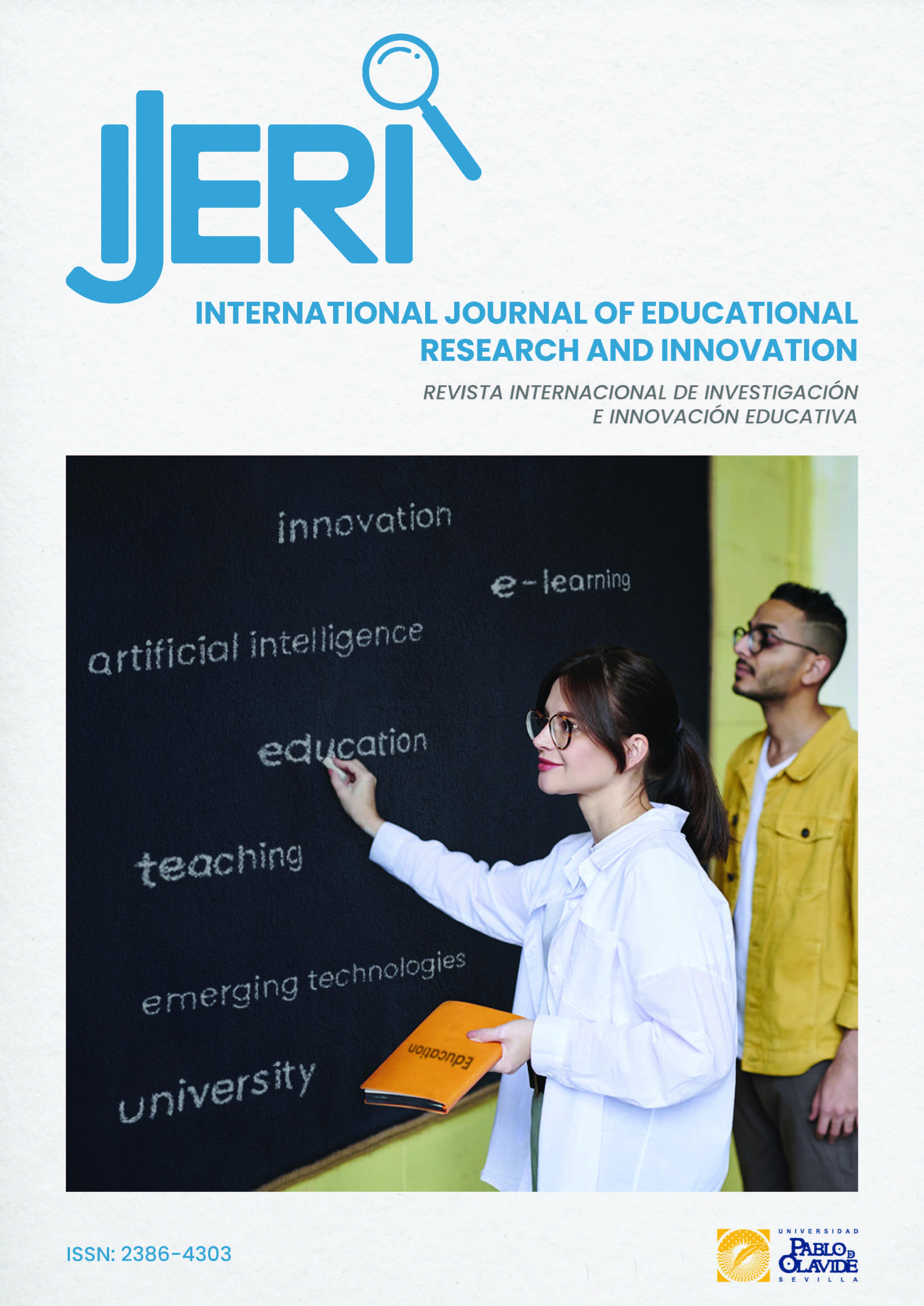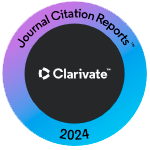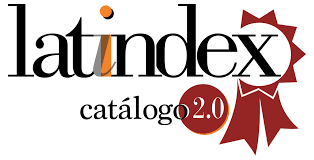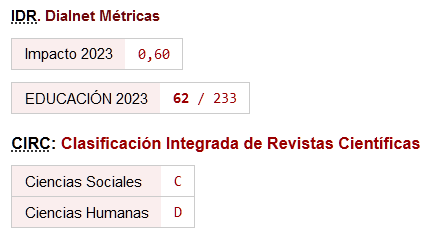Modelado de la relación entre las características demográficas digitales, la alfabetización digital y el rendimiento académico de estudiantes de matemáticas en un Entorno de Aprendizaje en Línea
DOI:
https://doi.org/10.46661/ijeri.9575Palabras clave:
Alfabetización digital, características demográficas digitales, rendimiento académico en matemáticas, aprendizaje en línea, análisis de rutaResumen
El propósito del estudio fue determinar las características demográficas digitales, la alfabetización digital y el rendimiento académico de los estudiantes de matemáticas en un entorno de aprendizaje en línea, así como modelar las relaciones entre estas variables. Para medir y obtener los datos necesarios, el estudio empleó un diseño de investigación de correlación predictiva y un cuestionario de investigación adaptado. Se realizó una encuesta con una muestra aleatoria de 322 estudiantes de los campus principales y externos de la universidad estatal de interés. Se realizaron una serie de regresiones y análisis de ruta para explorar cualquier variable significativa que pudiera describir las relaciones entre las variables estudiadas. Principalmente, el estudio encontró que los niveles de investigación, recuperación y gestión de la información mediaron total y significativamente las relaciones entre la disponibilidad de dispositivos tecnológicos, el uso de una plataforma electrónica de aprendizaje y el rendimiento académico en matemáticas de los estudiantes. En la validación del modelo, el segundo modelo demostró la consistencia de variables como la investigación y recuperación de información y la alfabetización en gestión de información al influir indirectamente en las relaciones entre la disponibilidad de dispositivos tecnológicos y el rendimiento académico. Se puede realizar un estudio junto con este estudio para utilizar el modelo diseñado en este estudio en otras ubicaciones para validar aún más la coherencia general del modelo.
Descargas
Citas
Aboagye E., Yawson, J. A., & Appiah, K. N. (2021). COVID-19 and e-learning: the challenges of students in a tertiary institution. Social Education Research, 2(1), 1-8. https://doi.org/10.37256/ser.212021422 DOI: https://doi.org/10.37256/ser.212021422
Agormedah, E. K., Henaku, E. A., Ayite, D. M. K., & Ansah, E. A. (2020). Online learning in higher education during COVID-19 pandemic: A case of Ghana. Journal of Educational Technology and Online Learning, 3(3), 183-210. https://doi.org/10.31681/jetol.726441 DOI: https://doi.org/10.31681/jetol.726441
Alabdulaziz, M. S. (2021). Covid-19 and the use of digital technology in mathematics education. Education and Information Technologies, 26(6), 7609-7833. https://doi.org/10.1007/s10639-021-10602-3 DOI: https://doi.org/10.1007/s10639-021-10602-3
Alakrash, H. M., & Abdul Razak, N. (2021). Technology-based language learning: Investigation of digital technology and digital literacy. Sustainability, 13(21), 12304. https://doi.org/10.3390/su132112304 DOI: https://doi.org/10.3390/su132112304
Alipio, M. (2020). Education during COVID-19 era: Are learners in a less-economically developed country ready for e-learning? ZBW-Leibniz Information Centre for Economics. https://doi.org/10.2139/ssrn.3586311 DOI: https://doi.org/10.2139/ssrn.3586311
Asio, J. M. R., Gadia, E., Abarintos, E., Paguio, D., & Balce, M. (2021). Internet connection and learning device availability of college students: Basis for institutionalizing flexible learning in the new normal. Studies in Humanities and Education, 2(1), 56-69. https://doi.org/10.48185/she.v2i1.224 DOI: https://doi.org/10.48185/she.v2i1.224
Baloran, E. T. (2020). Knowledge, attitudes, anxiety, and coping strategies of students during COVID-19 pandemic. Journal of loss and trauma, 25(8), 635-642. https://doi.org/10.1080/15325024.2020.1769300 DOI: https://doi.org/10.1080/15325024.2020.1769300
Bandura, A. (1977). Self-efficacy: toward a unifying theory of behavioral change. Psychological review, 84(2), 191-215. https://psycnet.apa.org/doi/10.1037/0033-295X.84.2.191 DOI: https://doi.org/10.1037//0033-295X.84.2.191
Barrios, J. M., & Hochberg, Y. (2020, April). Risk Perception through the Lens of Politics in the Time of the Covid-19 Pandemic (NBER Working Paper No. 27008). https://doi.org/10.3386/w27008 DOI: https://doi.org/10.3386/w27008
Ben Youssef, A., Dahmani, M., & Ragni, L. (2022). ICT use, digital skills and students’ academic performance: exploring the digital divide. Information, 13(3), 129. https://doi.org/10.3390/info13030129 DOI: https://doi.org/10.3390/info13030129
Cassibba, R., Ferrarello, D., Mammana, M. F., Musso, P., Pennisi, M., & Taranto, E. (2021). Teaching mathematics at distance: a challenge for universities. Education Sciences, 11(1), 1. https://doi.org/10.3390/educsci11010001 DOI: https://doi.org/10.3390/educsci11010001
Chung E., Subramaniam, G., & Dass, L.D. (2020). Online learning readiness among university students in Malaysia amidst Covid-19. Asian Journal of University Education, 16(2), 46-58. https://doi.org/10.24191/ajue.v16i2.10294 DOI: https://doi.org/10.24191/ajue.v16i2.10294
Cleofas, J.V., & Rocha, I.C.N. (2021). Demographic, gadget, and internet profiles as determinants of disease and consequence related Covid-19 anxiety among Filipino college students. Education and Information Technologies, 26, 6771-6786. https://doi.org/10.1007/s10639-021-10529-9 DOI: https://doi.org/10.1007/s10639-021-10529-9
Crawford, J., Butler-Henderson, K., Rudolph, J., Malkawi, B., Glowatz, M., Burton, R., Magni P., & Lam, S. (2020). Covid-19: 20 countries' higher education intra-period digital pedagogy responses. Journal of Applied Learning & Teaching, 3(1), 1-20. https://doi.org/10.37074/jalt.2020.3.1.7 DOI: https://doi.org/10.37074/jalt.2020.3.1.7
Education International. (2020, March). Guiding principles on the COVID-19 pandemic. European Trade Union Committee for Education. https://www.ei-ie.org/en/item/23276:guiding-principles-on-the-covid-19-pandemic
Fatema, K., Nasreen, S., Parvez, M. S., & Rahaman, M. A. (2020). Impact of using the Internet on students: A sociological analysis at Bangabandhu Sheikh Mujibur Rahman science and technology university, Gopalganj, Bangladesh. Open Journal of Social Sciences, 8(12), 71-83. https://doi.org/10.4236/jss.2020.812007 DOI: https://doi.org/10.4236/jss.2020.812007
Gibson, James J. (1977). The Theory of Affordances. In R. Shaw & J. Bransford (Eds.), Perceiving, acting, and knowing: toward an ecological psychology. Hillsdale, New York. https://monoskop.org/images/2/2c/Gibson_James_J_1977_The_Theory_of_Affordances.pdf
Hair Jr., J. F., Black, W. C., Babin, B. J., & Anderson, R. E. (2010). Multivariate data analysis (7 ed.): New Jersey: Prentice-Hall. https://www.drnishikantjha.com/papersCollection/Multivariate%20Data%20Analysis.pdf
Hammer, M. (2020). Identifying antecedents to learning effectively with digital media: A student-centered approach [PhD thesis, Universität Tübingen]. Universitatsbibliothek Publikationssytem. https://publikationen.uni-tuebingen.de/xmlui/handle/10900/110419
Irfan, M., Kusumaningrum, B., Yulia, Y., & Widodo, S. A. (2020). Challenges during the pandemic: use of e-learning in mathematics learning in higher education. Infinity Journal, 9(2), 147-158. https://doi.org/10.22460/infinity.v9i2.p147-158 DOI: https://doi.org/10.22460/infinity.v9i2.p147-158
Inan Karagul, B., Seker, M., & Aykut, C. (2021). Investigating students’ digital literacy levels during online education due to COVID-19 pandemic. Sustainability, 13(21), 1-11. https://doi.org/10.3390/su132111878 DOI: https://doi.org/10.3390/su132111878
Kline, T. J. B. (2005). Psychological testing: A practical approach to design and evaluation. SAGE publications, Thousand Oaks, 2005. https://doi.org/10.4135/9781483385693 DOI: https://doi.org/10.4135/9781483385693
Khirwadkar, A., Khan, S. I., Mgombelo, J., Obradovic-Ratkovic, S., & Forbes, W. A. (2020). Reimagining mathematics education during the COVID-19 pandemic. Brock Education: A Journal of Educational Research and Practice, 29(2), 42-46. https://doi.org/10.26522/brocked.v29i2.839 DOI: https://doi.org/10.26522/brocked.v29i2.839
Limniou, M., Varga-Atkins, T., Hands, C., & Elshamaa, M. (2021). Learning, student digital capabilities and academic performance over the COVID-19 pandemic. Education Sciences, 11(7), 361. https://doi.org/10.3390/educsci11070361 DOI: https://doi.org/10.3390/educsci11070361
López-Meneses, E., Sirignano, F. M., Vázquez-Cano, E., & Ramírez-Hurtado, J. M. (2020). University students’ digital competence in three areas of the DigCom 2.1 model: A comparative study at three European universities. Australasian Journal of Educational Technology, 36(3), 69–88. https://doi.org/10.14742/ajet.5583 DOI: https://doi.org/10.14742/ajet.5583
Maital, S., & Barzani, E. (2020). The global economic impact of COVID-19: A summary of research. Samuel Neaman Institute for National Policy Research, 1-12. https://www.neaman.org.il/EN/Files/Global%20Economic%20Impact%20of%20COVID-19_20200322163553.399.pdf
Mehrvarz, M., Heidari, E., Farrokhnia, M., & Noroozi, O. (2021). The mediating role of digital informal learning in the relationship between students' digital competence and their academic performance. Computers & Education, 167, 104184. https://doi.org/10.1016/j.compedu.2021.104184 DOI: https://doi.org/10.1016/j.compedu.2021.104184
Mendoza D., Cejas M., Rivas G., Varguillas C. (2021). Anxiety as a prevailing factor of performance of university mathematics students during the COVID-19 pandemic. The Education and Science Journal, 23(2): 94-113. https://doi.org/10.17853/1994-5639-2021-2-94-113 DOI: https://doi.org/10.17853/1994-5639-2021-2-94-113
Moscoso-Paucarchuco, K. M., Beraún-Espíritu, M. M., Nieva-Villegas, M. A., Sandoval-Trigos, J. C., & Quincho-Rojas, T. G. (2022). Digital competences and academic performance in university students: Non face-to-face education in times of covid-19 pandemic. Revista Investigacion Operacional, 43(4), 466-475
Mulenga, E.M., & Marbán, J.M. (2020). Is COVID-19 the gateway for digital learning in mathematics education? Contemporary Educational Technology, 12(2), 1-11. https://doi.org/10.30935/cedtech/7949 DOI: https://doi.org/10.30935/cedtech/7949
Murgatrotd, S. (2020). COVID-19 and online learning. https://www.researchgate.net/publication/339784057_COVID-19_and_Online_Learning
Muthuprasad, T., Aiswarya, S., Aditya, K. S., & Jha, G. K. (2021). Students’ perception and preference for online education in India during COVID-19 pandemic. Social Sciences & Humanities Open, 3(1), 100101. https://doi.org/10.1016/j.ssaho.2020.100101 DOI: https://doi.org/10.1016/j.ssaho.2020.100101
Naidoo, J. (2020). Postgraduate mathematics education students’ experiences of using digital platforms for learning within the COVID-19 pandemic era. Pythagoras, 41(1), 1-11. https://doi.org/10.4102/pythagoras.v41i1.568 DOI: https://doi.org/10.4102/pythagoras.v41i1.568
Peled, Y. (2020). Pre-service teacher’s self-perception of digital literacy: The case of Israel. Education and Information Technologies, 26(3), 2879-2896. https://doi.org/10.1007/s10639-020-10387-x DOI: https://doi.org/10.1007/s10639-020-10387-x
Peled, Y., Kurtz, G., & Avidov-Unger, O. (2021). Pathways to a knowledge society: A proposal for a hierarchical model for measuring digital literacy among Israeli pre-service teachers. Electronic Journal of e-Learning, 19(3), 118-132. https://doi.org/10.34190/ejel.19.3.2217 DOI: https://doi.org/10.34190/ejel.19.3.2217
Reuge, N., Jenkins, R., Brossard, M., Soobrayan, B., Mizunoya, S., Ackers, J., Jones, L., & Taulo, W. G. (2021). Education response to COVID 19 pandemic, a special issue proposed by UNICEF: Editorial review. International Journal of Educational Development, 87, 102485. https://doi.org/10.1016/j.ijedudev.2021.102485 DOI: https://doi.org/10.1016/j.ijedudev.2021.102485
Schumacker, R. E., & Lomax, R. G. Lomax. (2004). A beginner's guide to structural equation modeling (2nd ed.), New Jersey: Lawrence Erlbaum Associates. https://doi.org/10.4324/9781410610904 DOI: https://doi.org/10.4324/9781410610904
SEAMEO. (2020). Maximising learning: Education responses amidst the COVID-19 crisis and beyond. Journal of Southeast Asian Education, 2. https://www.seameo.org/img/Publications/SEAMES/SEAMEO%20Journal%202020%20%20V2%20Special%20Issue.pdf
Tabachnick, B. G., & Fidell, L. S. (2013). Using multivariate statistics (6th ed.). Boston, MA: Pearson.
UNESCO. (2020). Global Monitoring of School Closures caused by COVID-19. https://en.unesco.org/covid19/educationresponse
Wahyuni, Y., Jamaris, & Solfema (2021). Integration of digital technology in mathematics learning. International Journal of Humanities Education And Social Sciences, 1(3). 144-151. https://doi.org/10.55227/ijhess.v1i3.60 DOI: https://doi.org/10.55227/ijhess.v1i3.60
Worldbank Bank Group Education. (2020, April 8). The COVID-19 Crisis Response: Supporting tertiary education for continuity, adaptation, and innovation. Open Knowledge Repository. http://hdl.handle.net/10986/34571
Yustika, G. P., & Iswati, S. (2020). Digital literacy in formal online education: A short review. Dinamika Pendidikan, 15(1), 66-76. https://doi.org/10.15294/dp.v15i1.23779 DOI: https://doi.org/10.15294/dp.v15i1.23779
Yousef, S., & Yousef, K. (2022). The impact of Facebook usage in education on students’ academic performance at the University of Jordan. Journal of E-Learning and Knowledge Society, 18(1), 59-74. https://doi.org/10.20368/1971-8829/1135393
Zaharah, Z., & Kirilova, G. I. (2020). Impact of corona virus outbreak towards teaching and learning activities in Indonesia. SALAM: Jurnal Sosial Dan Budaya Syar-I, 7(3), 269–282. https://doi.org/10.15408/sjsbs.v7i3.15104 DOI: https://doi.org/10.15408/sjsbs.v7i3.15104
Zulkarnain, Z., Heleni, S., & Thahir, M. (2020). Digital literacy skills of math students through e-learning in COVID-19 era: A case study in Universitas Riau. In Journal of Physics: Conference Series, 1663(1). https://doi.org/10.1088/1742-6596/1663/1/012015 DOI: https://doi.org/10.1088/1742-6596/1663/1/012015
Descargas
Publicado
Cómo citar
Número
Sección
Licencia
Derechos de autor 2024 Eduardo Edu Jr. Cornillez

Esta obra está bajo una licencia internacional Creative Commons Atribución-NoComercial-SinDerivadas 4.0.











